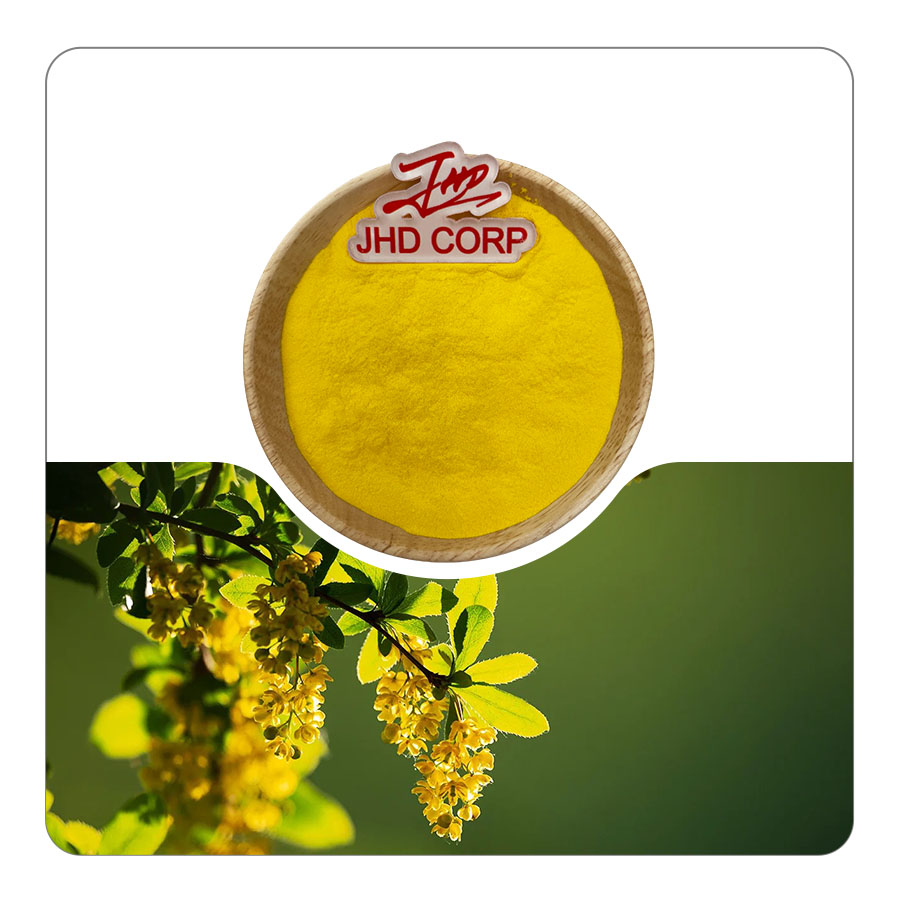Welcome to JHD Nutrasource!
Shop
Berberine
Berberine is a bioactive alkaloid compound found in several plants, including goldenseal (Hydrastis canadensis), barberry (Berberis vulgaris), Oregon grape (Mahonia aquifolium), and Chinese goldthread (Coptis chinensis). Berberine is typically extracted from the roots, stems, and bark of these plants through processes involving solvents like ethanol or water. It is available in various forms, such as capsules, tablets, and powders.
Description
| Product Name | Berberine |
| Appearance | yellow to light brown |
| Specification | ≥95%, ≥98%, or ≥99% |
| Test Method | HPLC |
| Source | the roots, stems, and bark |
| Certificate | Organic,Kosher/Halal,GMP,Non-GMO |
Function
- Antimicrobial Properties: Berberine has broad-spectrum antimicrobial activity against bacteria, fungi, and parasites. It is effective against various pathogens, including those responsible for gastrointestinal infections, urinary tract infections, and skin infections.
- Antioxidant Effects: Berberine acts as a potent antioxidant, helping to neutralize free radicals and reduce oxidative stress in the body. This can protect cells from damage and lower the risk of chronic diseases such as cancer and cardiovascular disease.
- Blood Sugar Regulation: One of the most well-known functions of berberine is its ability to regulate blood sugar levels. It can improve insulin sensitivity, reduce glucose production in the liver, and enhance glucose uptake in cells. This makes it beneficial for managing type 2 diabetes and improving metabolic health.
- Cholesterol Management: Berberine can help lower cholesterol levels by reducing low-density lipoprotein (LDL) cholesterol and triglycerides while increasing high-density lipoprotein (HDL) cholesterol. This can contribute to better cardiovascular health and reduce the risk of heart disease.
- Anti-inflammatory Effects: Berberine has anti-inflammatory properties, which can help reduce inflammation in the body. This is beneficial for managing chronic inflammatory conditions such as arthritis and inflammatory bowel disease.
- Weight Management: Some studies suggest that berberine may aid in weight loss by reducing appetite and improving metabolic function. It can also help regulate fat metabolism, making it a potential supplement for weight management programs.
- Neuroprotective Effects: Berberine has been shown to have neuroprotective properties, potentially reducing the risk of neurodegenerative diseases such as Alzheimer’s and Parkinson’s. It can cross the blood-brain barrier and exert antioxidant and anti-inflammatory effects in the brain.
Application
- Dietary Supplements: Berberine is widely used in dietary supplements, often marketed for blood sugar regulation, cholesterol management, and overall metabolic health.
- Traditional Medicine: In traditional medicine, particularly in Chinese and Ayurvedic medicine, berberine has been used for centuries to treat various ailments, including infections, digestive disorders, and skin conditions.
- Functional Foods and Beverages: Berberine can be incorporated into functional foods and beverages, such as fortified drinks and snacks, to provide additional health benefits. These products aim to support metabolic health and reduce inflammation.
- Pharmaceuticals: In the pharmaceutical industry, berberine is being studied for its potential use in treating type 2 diabetes, cardiovascular disease, and other chronic conditions. It may be used as an adjunct therapy to support overall health and reduce the risk of disease.
- Cosmetics and Skincare: The antioxidant and anti-inflammatory properties of berberine make it suitable for use in cosmetics and skincare products. It can be found in creams, serums, and masks designed to protect the skin from environmental damage and promote overall skin health.
- Veterinary Medicine: Berberine is also used in veterinary medicine to support the health and well-being of animals. It can be added to pet food or administered as supplements to improve metabolic health and reduce inflammation in pets.

